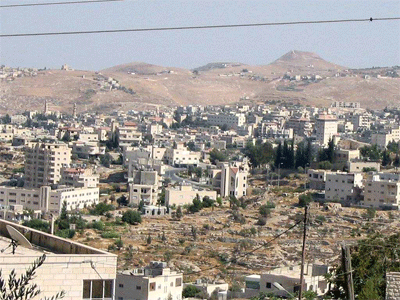
|
 |
| Beit Sahur. Photo: http://www.palestineremembered.com |
| Umm Jamil Hilal, Beit Sahur, October 30, 1999:
|
|
Jamil, a Palestinian friend from Beirut, once told me a story about his mother from his early childhood that stayed in my mind. It was the winter after the 1948 expulsions, the harshest winter in fifty years. The Hilal family were not well off, and lived in a rented home. The house-owner, a woman, had just told them they had to pay more rent or leave. Jamil described watching from the window with his many siblings as his mother, a tiny woman, went out in the snow to challenge the owner, and ended up giving her a hearty hit. So on a visit to Jerusalem in October 1999, I asked Jamil if he would take me home to record with his mother.
This was a recording session that did not go well at first. I remember feeling desperate, since Umm Jamil was claiming not to remember the past, and telling me nothing interesting. The situation was saved by one of her daughters-in-law who started reminding her of stories she had told the family, thus 'kickstarting' a rich train of recollections. Umm Jamil told the story of the fight with the landlady, but not at the beginning, and not in the way I remembered hearing it from Jamil. He had described this dramatic scene, of his mother physically challenging the house-owner who towered above her, and delivering her a 'kaff' (blow) that sent her scurrying away. His mother, fifty years after the incident, gave a version which diminished the combativeness of the incident and partially exonerated the land-owner. Had the 'real' scene been as Jamil or as his mother remembered it? I reflected that the disinclination that Palestinians often show to dig up the past probably arises from the social habit of 'forgetting' conflict, in order to |
preserve harmony in communities where family units change little over time. What Jamil remembered of the incident, the contrast between the house-owner's size/power, and his own diminutive mother's victory, probably remained stamped on his mind and helped form his politics.
The first incident that Umm Jamil recalled was the death of her husband.
Umm Jamil Hilal speaks: |
[Hajj Khalil Bseiss] [Speakers in the West Bank] Copyright©2005 |
|